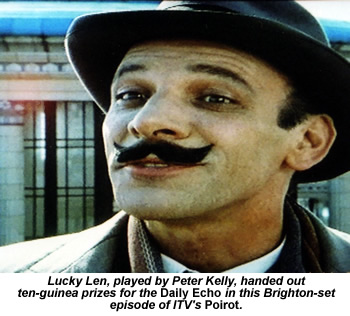 As it turned out, all Lobby's efforts were not enough to save the Gazette, which was taken over by the Daily News in January 1928. The Daily News itself was merged into the News Chronicle two years later. Lobby migrated to each paper's summer campaign in turn, but with steadily diminishing results. Chinn continued to play Lobby until the 1930 campaign was complete, and then handed the role over to another reporter. By the time this replacement reached his 1933 News Chronicle tour, the prize on offer had shrunk to just £10, and the biggest fuss he could report was a few bungled challenges.
As it turned out, all Lobby's efforts were not enough to save the Gazette, which was taken over by the Daily News in January 1928. The Daily News itself was merged into the News Chronicle two years later. Lobby migrated to each paper's summer campaign in turn, but with steadily diminishing results. Chinn continued to play Lobby until the 1930 campaign was complete, and then handed the role over to another reporter. By the time this replacement reached his 1933 News Chronicle tour, the prize on offer had shrunk to just £10, and the biggest fuss he could report was a few bungled challenges.
We have no reliable newspaper circulation figures before about 1935, when the Audit Bureau of Circulations set up shop, so we don't know exactly the effect that Lobby had on Gazette sales. We do know that the Daily Herald was selling a comparatively modest 300,000 copies a day in the 1920s, and it's safe to assume the Gazette's figure was a good bit lower. “Its comparative low circulation may go some way towards explaining its adoption of special promotions such as the Lobby Lud phenomenon,” says Christian Algar of the British Newspaper Library. “Regrettably, there is just no information to establish if it boosted sales.” (28)
The fact that the Gazette was taken over in January 1928 suggests Lobby's effect cannot have been a spectacular one, but it certainly had some value. Assuming the paper had trademarked Lobby Lud - which seems very likely - that trademark may well have been one of the assets which made the Gazette worth buying. Certainly, the Daily News and its successors thought Lobby was worth persisting with for the next seven years, and they wouldn't have done that if he wasn't earning his keep in extra sales. All the papers involved would have expected their circulations to fall sharply in the summer months, simply because people were less bothered about following the news while on holiday. Lobby's role may have been to cancel out that decline rather than to add brand-new readers, and it wasn't until 1935 that the character was finally withdrawn.
Chinn followed his creation into retirement in due course, and returned to his native Cardiff. That's where the writer Miles Kington found him when preparing a 1983 Radio 4 documentary on the Lobby Lud phenomenon. Willie, by then 91 years old, was happy to share memories of his glory days touring Britain's coast with his friends Elfreda and Trevor.
“We'd arrive at a hotel, perhaps ten o'clock at night, and feel very well-pleased with the day, whether I'd been caught or not,” he told Kington. “And the three of us would go for a walk along the front, along the cliffs, getting the feel of the place. When I think of those occasions now, I think what an enjoyment there was in them. The three of us going along, enjoying the lovely seaside air, all expenses paid. If ever there was pleasure in work, or the aftermath of a day's work, it was that.”
Sources
1) Westminster Gazette, September 14, 1927.
2) Westminster Gazette, July 30, 1927.
3) Wikipedia (http://en.wikipedia.org/wiki/List_of_works_by_Agatha_Christie)
4) Wikipedia (http://en.wikipedia.org/wiki/Agatha_Christie)
5) InfoBritain (http://www.infobritain.co.uk/Silent_Pool.htm)
6) The Straight Dope, by Cecil Adams (Ballentine Books, 1986).
7) You Are Mr Lobby Lud, presented by Miles Kington (BBC Radio 4, May 3, 1983).
8) Westminster Gazette, August 5, 1927.
9) Westminster Gazette, August 9, 1927.
10) Westminster Gazette, August 10, 1927.
11) Westminster Gazette, August 11, 1927.
12) Westminster Gazette, August 12, 1927.
13) Westminster Gazette, August 16, 1927.
14) Westminster Gazette, August 17, 1927.
15) Westminster Gazette, August 20, 1927.
16) Westminster Gazette, September 5, 1927.
17) Westminster Gazette, September 6, 1927.
18) Westminster Gazette, September 8, 1927.
19) Westminster Gazette, September 13, 1927.
20) Westminster Gazette, September 29, 1927.
21) Westminster Gazette, September 19, 1927.
22) Westminster Gazette, September 20, 1927.
23) Westminster Gazette, September 30, 1927.
24) Westminster Gazette, October 19, 1927.
25) Westminster Gazette, August 13, 1927.
26) Westminster Gazette, August 18, 1927.
27) Westminster Gazette, October 14, 1927.
28) Letter from British Newspaper Library, October 29, 2009.
29) Lobby Lud The Mystery Man, by Fred Sandford & Fred Malcolm (Lawrence & Wright, 1927).
30) Brighton Rock, by Graham Greene (Vintage, 2002).
31) Read All About It: 100 Sensational Years of the Daily Mirror, by Bill Hagerty (First Stone Publishing, 2003).
32) Private Eye 180, November 8, 1968.
33) Guardian, August 16, 1980.